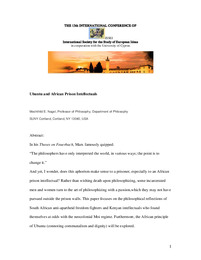Ubuntu and African Prison Intellectuals
| dc.contributor.author | Nagel, Mechthild E. | en |
| dc.contributor.editor | Papastephanou, Marianna | en |
| dc.contributor.editor | Gregoriou, Zelia | en |
| dc.contributor.editor | Koutselini, Mary | en |
| dc.contributor.editor | Zembylas, Michalinos | en |
| dc.creator | Nagel, Mechthild E. | en |
| dc.date.accessioned | 2013-02-28T06:50:02Z | |
| dc.date.available | 2013-02-28T06:50:02Z | |
| dc.date.issued | 2012-07 | |
| dc.identifier.uri | http://gnosis.library.ucy.ac.cy/handle/7/64930 | |
| dc.identifier.uri | http://hdl.handle.net/10797/6156 | |
| dc.description.abstract | In his Theses on Feuerbach, Marx famously quipped: �The philosophers have only interpreted the world, in various ways; the point is to change it.� And yet, I wonder, does this aphorism make sense to a prisoner, especially to an African prison intellectual? Rather than wishing death upon philosophizing, some incarcerated men and women turn to the art of philosophizing with a passion,which they may not have pursued outside the prison walls. This paper focuses on the philosophical reflections of South African anti-apartheid freedom fighters and Kenyan intellectuals who found themselves at odds with the neocolonial Moi regime. Furthermore, the African principle of Ubuntu (connoting communalism and dignity) will be explored. | en |
| dc.language.iso | eng | en |
| dc.rights | info:eu-repo/semantics/openAccess | en |
| dc.rights | Open Access | en |
| dc.title | Ubuntu and African Prison Intellectuals | en |
| dc.type | info:eu-repo/semantics/conferenceObject | en |
Files in this item
This item appears in the following Collection(s)
-
ISSEI - International Society for the Study of European Ideas [129]
13th ISSEI International Conference, University of Cyprus, July 2-6, 2012
